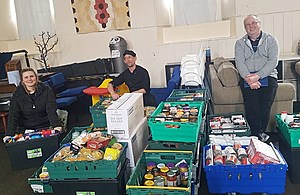Thank you, Chair, and thank you Director General, for your opening remarks.
In line with others, I want to thank you, on behalf of the United Kingdom, for calling this meeting on the multilateral trade response, to the most serious global challenge in a generation, one that is also transforming the global trading system, and as the WTO’s own analysis shows, risks seriously undermining it.
But first, I would like to recall my statement at the Heads of Delegation meeting yesterday, conveying the United Kingdom’s warmest wishes to Director General Azevedo, upon the announcement of his stepping down, and thanking him for all he has done – and will continue to do – throughout his term. The United Kingdom heeds the DG’s call for Members to move quickly to appoint a successor, and stands ready to support Ambassador David Walker with the next steps in the process.
Now, let me turn to today’s discussion on the Covid-19 crisis.
This is a global crisis. This pandemic is already the worst international health crisis for a century. By the time it it finished, it risks also becoming the worst economic crisis since the Great Depression, and a global social and political crisis into the bargain.
The multilateral system has a critical role to play in mitigating this worst case scenario, and, to coin a phrase, bending the curve of this crisis below the ability of the global political and economic system to cope. Geneva has already responded well, and after a difficult negotiation, the World Health Assembly will adopt an important resolution on Monday, to guide us through the next phase of the pandemic, and ensure we learn and adapt as we go forward.
The WTO also has a major role to play. While we understand the challenges for the organisation in meeting formally, it is still the world’s leading platform for discussing global trade, with senior trade representatives from around the world. It is the place where the impact on COVID-19 on the global trading system should be discussed, where ideas and solutions should be shared, and were initiatives to mitigate the global economic crisis to come, launched.
In that spirit, the UK welcomes today’s meeting of the General Council, and looks forward to much more debate in the future.
Now, let me turn to the WTO response more specifically.
So far, the Secretariat has proactively collated information and published useful analytical pieces. In support of that effort, the United Kingdom has provided relevant information, including regularly contributing to the Covid specific surveillance platform hosted on the WTO webpage and submitting a return to the Director General for the Trade Monitoring Report.
The United Kingdom would welcome more frequent Trade Monitoring reports – for example, returning to the quarterly reports during the financial crisis. We agree with Switzerland that there is much more that the WTO and is Members can do. The WTO needs to be the place where the trade restricting measures that have been introduced in response to COVID-19 are reported, their consequences debated, and our collective determination to resist serious damage they could do to the global economy expressed.
The UK also welcomes the fact that Members have started to coordinate responses to Covid, informally through the WTO, as well as through other groupings like the G20.
So, together with a range of other WTO Members, the United Kingdom has cosponsored statements on key issues.
For example, we believe in the importance of keeping global agricultural supply chains open, especially given the relatively high levels of food stocks and production we see globally, so signed the statement led by our Canadian colleagues. We welcome the idea of holding a dedicated meeting in June to discuss this.
We were also pleased to support the Swiss-led statement in support of the multilateral trading system, and the statement in support of MSMEs led by our Uruguayan, Canadian and Mexican colleagues.
As this crisis evolves, we will continue to work with Members on appropriate initiatives supporting free, fair and inclusive rules-based trade. We will also seek to advance this agenda elsewhere, and like the DG, we welcome the the outcomes agreed at the virtual extraordinary G20 Trade Ministers’ meeting yesterday.
We are keenly aware that many developing country partners, as well as small island states and other vulnerable economies, are experiencing a serious period of trade shock, as currency depreciations combine with sharp declines in important export sectors like tourism. This potentially jeopardises decades of hard-fought, trade-led prosperity.
Today I’d like to announce that, through the UK’s Trade and Investment Advocacy Fund and our funding to the World Bank, we are providing support to eligible developing country Members to better understand the trade-related impacts of COVID-19 on their economies, notify COVID-related measures to the WTO’s monitoring exercise, and tackle the COVID crisis through better trade facilitation.
Lastly, Chair, let me turn to the importance of continuing with regular business.
It is important that this crisis does not set back the important work that the WTO has been tasked with. Beyond ensuring the reinstatement of a fully functioning dispute resolution system, and continuing the crucial regular monitoring and transparency work, we need to continue to work on live negotiations.
These negotiations – including on fisheries subsidies, e-commerce, MSMEs, domestic regulation in services and investment facilitation for development– are a critical part of a broader discussion on how this institution should better meet the needs of 21st century business and society.
Thank you Chair.

